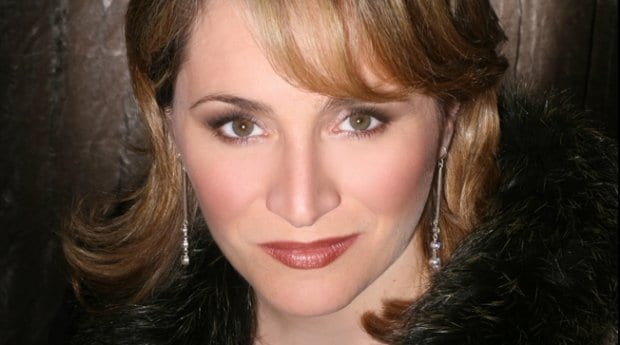Opera is very seldom described as sassy. But thanks to American soprano Patricia Racette, opera and sass can not only coexist, but marry beautifully with a Bette Midler–esque gusto. Racette’s recent repertoire detour into cabaret songs and chansons was loved by the media and the cabaret audience alike, and in person Racette is all verve and charm, her no-nonsense honesty peppered with a good serving of comedy. She’s in Toronto this season for Puccini’s Madame Butterfly.
How does she, as a singer, make the Puccini women credible to women of the 21st century? “I try to portray Butterfly with more complexity than simply as a girl being victimized,” Racette says. In the opera, the Japanese teen Cio-Cio San gets seduced by an American whose abandonment eventually leads to her suicide. “She really is in love with Pinkerton and finds the uniqueness about him as a person — and I think him as a different race — very appealing, and the same is true for him. That is where the excitement, the love, the lust, come into play.”
Second, Butterfly is not entirely devoid of agency. “By deciding to be with Pinkerton, she is an absolute primary participant in her fate. She will even change her faith for him, without him asking her to.” There is the self-destructive urge, the unwillingness to let go, but the layers and contradictions are visible even in the arias, Racette says. “For example, “Un bel dí” is a very beautifully vanity-filled articulation of her hope. But I think when the whole aria is done, there is a moment of doubt. The ‘Oh god, I hope I’m right’ moment. You have to make all this visible. You have to layer dark with light and doubt with hope. The pitfall of this opera is to play Butterfly too simplistically as a victim and nothing but.”
Tosca, Suor Angelica, Manon Lescaut, Leonora: just about every heroine she sings has, to put it mildly, unresolved issues with men. Nothing could be further from Racette’s personal life, whose marriage with the mezzo Beth Clayton is 17 years young and going strong. Listening to Racette talk about Clayton is a pleasure: the wisecracking singer turns a little misty-eyed and sweetly giddy.
They met at a party a few months before they were booked to appear in the same production of La Traviata, and, in the words of Racette, “there was instant chemistry. It was undeniable. After that summer, we made huge changes in each of our individual lives and have been together ever since.” She particularly enjoys the many ways they complement each other. “Our likes and our differences are so well matched. Things that I want to take on and deal with in our lives she doesn’t and vice versa. We are really good.” She is quick to add, “I have to give most of the credit to Beth. She’s such an extraordinary being. I just lucked out.”
Clayton now travels with Racette frequently, but for many years each singer used to travel separately, pursuing her own projects. “That was hard,” Racette says. The time apart doesn’t make the heart grow fonder? “We don’t take one another for granted. She is my favourite thing in the whole world. And we just want to be with one another.”
Racette and Clayton came out in an Opera News interview in 2002. (Out-and-proud opera singers weren’t many then, and nor are they now.) “The question would come up so often: ‘Are you married?’ And I thought, Why would I act ashamed about my love and hide it? I am proud and blessed for having her in my life. That was the driving force for the decision.” The coming out, Racette explains, has helped her become a freer, more committed artist, too. “I really need to feel like myself. I need to feel I bring and transform myself into the character that I sing. If I feel the emotion needs to be pasted on or is not rooted in my core, I’m not serving the work in the way I should.”
In the years to come, we are likely to see Racette try out more of the Germanic repertoire (she will repeat the recently debuted Strauss’s Salome onstage in San Antonio next year) but also more musical theatre (she sang in Show Boat in San Francisco this summer). She is back at the NYC’s Metropolitan Opera as Nedda in Pagliacci next year, in a new production by David McVicar.
Her recent cabaret album, Diva on Detour, and the live performances have been hailed as a particularly successful case of crossover, but no surprise there: Racette began her musical training as a jazz singer before discovering her operatic voice. There is another American Songbook album in the works, and she’ll continue to make the songs her own by occasionally changing genders in the lyrics. If anybody can turn Gershwin’s “I got rhythm, I got my girl” into a queer anthem, no doubt it’ll be Racette.
Madame Butterfly runs Fri, Oct 10–Fri, Oct 31 at the Four Seasons Centre, 145 Queen St W.
coc.ca

 Why you can trust Xtra
Why you can trust Xtra


